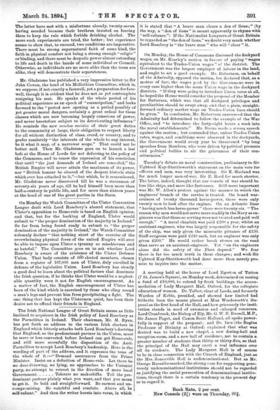On Monday, the House of Commons discussed the dockyard wages,
on Mr. Kearley's motion in favour of paying "wages equivalent to the Trades-Union wages " of the district. The Government was the largest employer of labour in the land, and ought to set a good example. Mr. Robertson, on behalf of the Admiralty, opposed the motion, but declared that, as a matter of fact, the wages p Lid by the Government were in every case higher than the mean Union wage in the dockyard districts. " If they were going to introduce Union rates at all, he hoped the House would consider the proposal of the Member for Battersea, which was that all dockyard privileges and peculiarities should be swept away, and that a plain, straight- forward ordinary market wage on Trades-Union lines should be given." In conclusion, Mr. Robertson announced that the Admiralty had determined to follow the example of the War Office, and "to introduce the forty-eight hours a week into the naval establishments." Mr. Barns made a strong speech against the motion ; but contended that, unless Trades•Union rates, wages, and conditions were observed in the dockyards, the Government would every year be threatened " by long speeches from Members, who were driven by political pressure and political bullies to air the grievances of their con- stituencies."


































 Previous page
Previous page